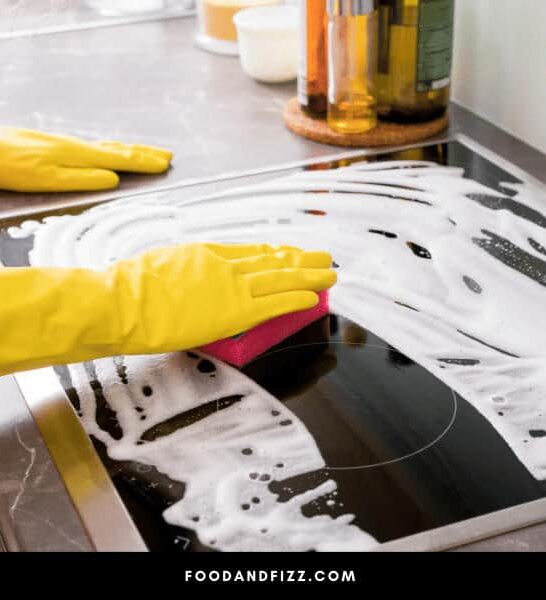My joy of cooking is highly motivated by my love for good food and cooking in a clean kitchen. But because of cooking daily, there is always the risk of grease building up.
It becomes even more difficult for me to remove it when that happens. So how can one prevent grease buildup in the first place?
How To Prevent Grease Build Up In Kitchen
The easiest ways to stop grease from building up are regular cleaning, installing a kitchen exhaust, cleaning stove burners, and disposing of excess grease properly. While you cannot prevent grease from collecting in the kitchen, you can have measures in place to manage it and prevent buildup.
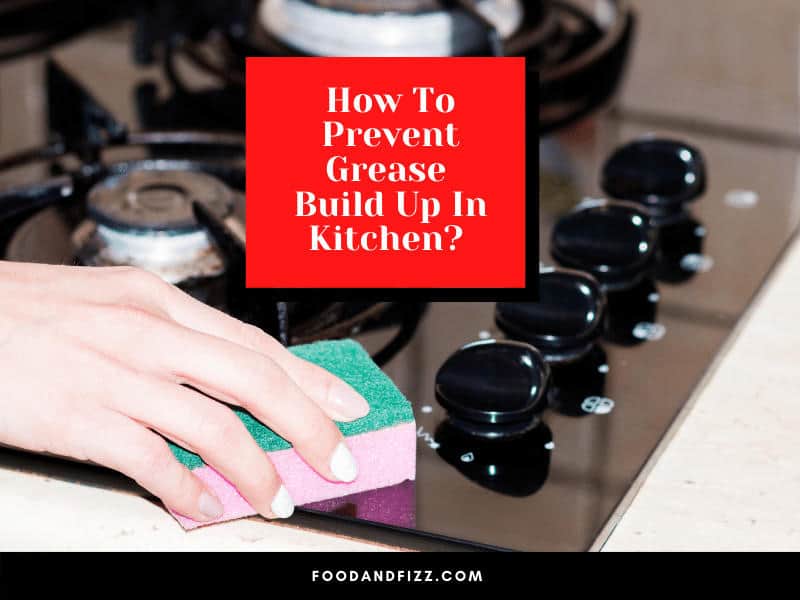
10 Tips on How to Prevent Grease Build up
Let us now look at the different strategies that you can use to prevent grease buildup in the kitchen.
1. Ensure Your Kitchen Is Properly Ventilated
An airy and properly ventilated kitchen is one of the keys to preventing grease buildup. Each time you are preparing a meal, run the exhaust fan. It will help remove the excess oil particles coming from your cooking.
Once in a while, the exhaust system will also need some cleaning. As much as it is sucking up the grease, the oils can also build up inside it, posing the risk of fire.
To be safe, use a mixture of water and liquid dish soap and gently wipe the hood. You will also need to change the filters regularly.
2. Keep the Kitchen Clean
As long as you cook daily, you will need to clean your kitchen regularly. Use warm water, a soft cloth, and a degreasing product.
As you wash the dishes, wipe the stove as well to remove any grease that may have splattered as you cook. If you do not do this, the oil will simply form layers, making your cleaning job difficult.
Do not forget to clean the fridge handle, coffee maker, microwave, and the seasoning or spice containers as long as you have used them.
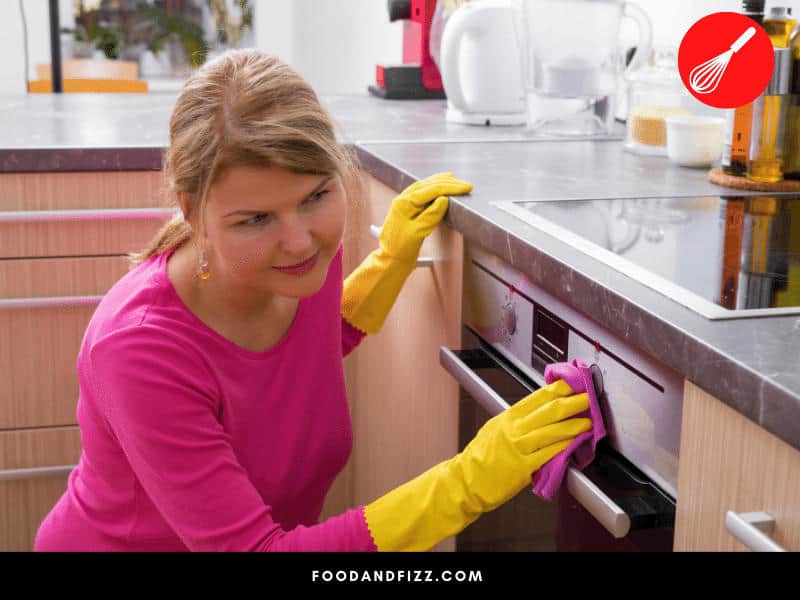
3. Keep Yourself Clean
As you continue cooking, wash your hands, especially after touching anything with grease. I have realized that the only way my cabinet handles can get oily is because I touch them when my hands have some grease.
So to prevent grease buildup on the kitchen shelves, cupboards, and drawers, I wash my hands first.
Most of us do not remember to wipe these areas daily when cleaning. So the grease builds up and eventually makes our cleaning job hard.
Vinegar is a great product for eliminating grease. Spray it on the surfaces you suspect have some oil, give it about 20 minutes, then wipe with a sponge.
4. Don’t Throw Greasy or Oily Foods Down the Sink
While it may seem like an easy solution to clean up the kitchen, I do not recommend pouring greasy or oily food down your sink drain. This is the beginning of grease building up and down your drain.
Before you start washing the dishes, take a paper towel and wipe off excess food scraps from your plates.
I also soak any dishes that may have a lot of grease in a mixture of warm water and a grease dissolving cleaner before I start the washing process.
It is impossible to prevent greasy substances from getting into the kitchen drain completely. So to prevent buildup, I will run a lot of hot water mixed with grease-cutting soap down the sink. Doing this will often break down any accumulating grease.
5. Get a Splatter Guard
If cleaning the stove is one of your least favorite chores, then I suggest getting a splatter guard. It will come in handy when you are frying that bacon or searing some steak.
The splatter guard has a mesh that prevents oil from splattering on your hands, stovetop, and floors. The mesh keeps the grease in but allows steam to escape.
With less grease splattered all over the kitchen, there will be less grease buildup.
6. Clean Up as You Cook
I’m one of those people that hates seeing dishes piled up in the sink. So I always clean whatever I’m done using immediately.
Leaving dirty dishes sitting in the sink for a long time once they are done soaking will only contribute to grease buildup in the sink drain.
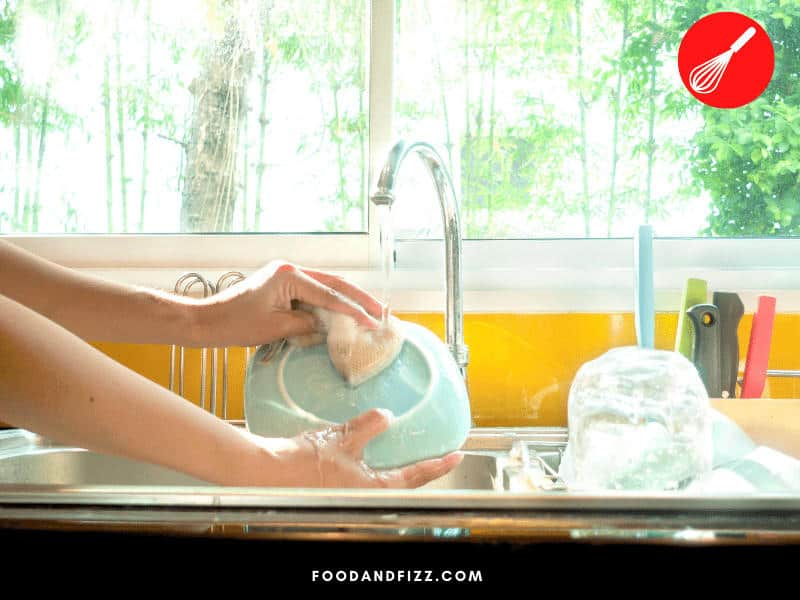
7. Make Use of Your Cabinet Space
The more items you have on your counter, the more items grease will splatter on. And most of the time, if it is an item you have not used in cooking, you are likely not to clean it up.
So instead, store most objects you do not need in your cabinet to prevent them from getting coated with kitchen grease.
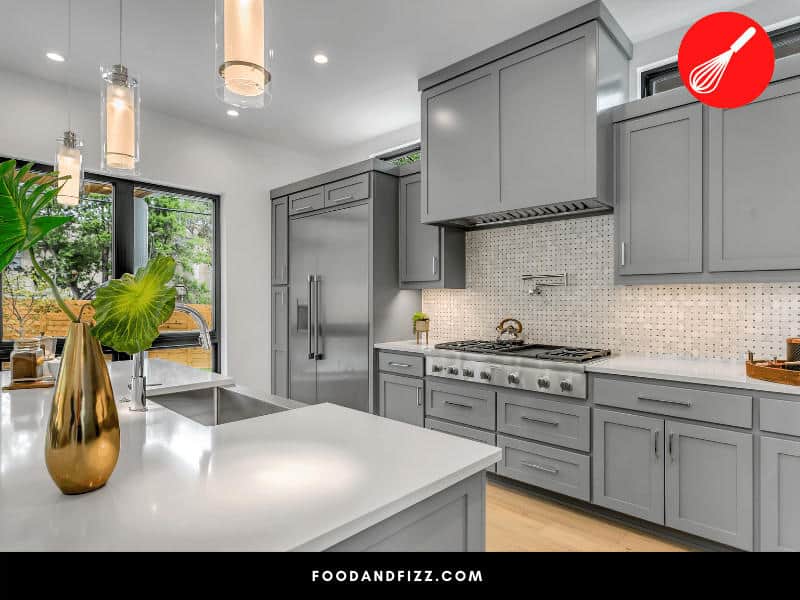
8. Cook Using Lower Temperatures
If the meal you are prepping does not have a temperature restriction, then cook at a lower temperature. This will prevent grease from splattering all over the stove and the kitchen counter.
9. Get The Right Size Pan
One of the reasons you may be battling grease every now and then in the kitchen is because you use a small pan to prepare your meals. Invest in a large pan, giving your food enough space to cook so that it does not splatter all over your stove, counters, and backsplash.
10. Clean Your Kitchen Floors
Grease can accumulate on your kitchen floors easily when you are cooking or cleaning. Ensure you clean up thoroughly to prevent grease buildup and reduce the risk of a family member falling.
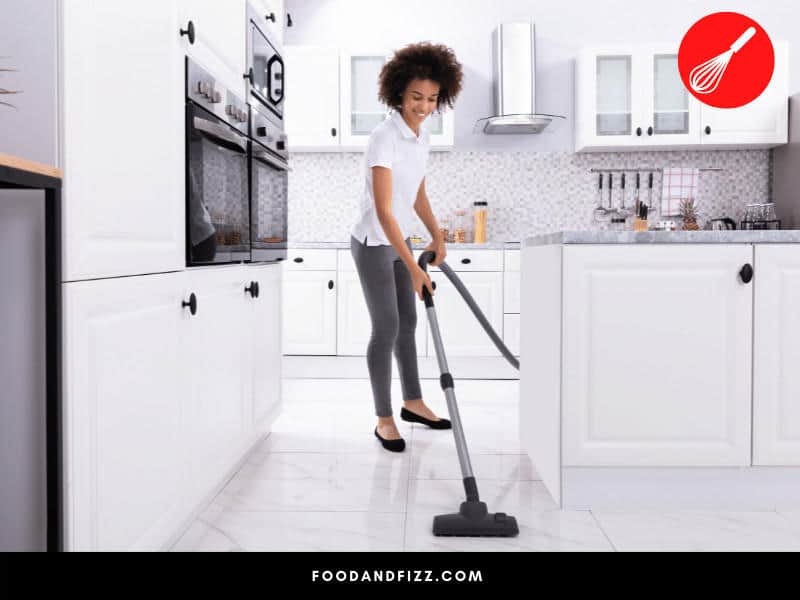
Why Does Grease Build Up in the Kitchen?
Every time you are cooking with oil, which is like daily, oil and oil vapor escape the pot and land on anything that is nearby. Also, when you are prepping meats with high animal fat content like pork, lamb, and beef, some of the fat makes its way to your counter, backsplash, floor, and many other surfaces.
If you do not clean up your kitchen often and thoroughly, these oils will build up on whatever surface they land on. Gradually, the grease dries up and becomes sticky and challenging to clean up.
What Is the Best Degreaser for The Kitchen?
Vinegar. You can remove grease with vinegar on any surface around your kitchen. The acetic acid in the vinegar helps cut through the grease. Combine it with liquid soap, and you will not only be removing grease from your kitchen surfaces but also disinfecting them.
How Do You Get Rid of Heavy Grease Build Up
If grease has already built up inside your kitchen, you can get rid of it with baking powder. It is a great cleaning solution that can remove stains from a lot of surfaces.
It does a good job of dissolving grease without damaging the surface you are cleaning. Mix one cup of water and three tablespoons of baking powder, and use a sponge to remove grease stains on your surfaces.
Conclusion to How To Prevent Grease Build Up In Kitchen?
Do not allow grease to build up in your kitchen. Besides the fact that it can make your kitchen look unpleasant, it also increases the risk of kitchen fires because grease is flammable. Clean your kitchen regularly, and you will not have to worry about grease buildup.
Frequently Asked Questions on How To Prevent Grease Build Up In Kitchen?
Can I Remove Grease Using Lemon Juice?
Grease can be removed using lemon juice. It has acidity, just like vinegar that cuts through the grease. Squeeze some of the juice on the surface you want to clean, leave it for 15 minutes and wipe with a wet sponge.
Why is Everything In My Kitchen Sticky?
The sticky residue on your kitchen surfaces is caused by fats from foods, cooking oil, and dirt. It comes from oil vapor as you prepare a meal. If not wiped immediately, it accumulates and becomes sticky.

